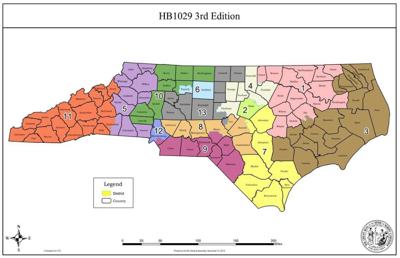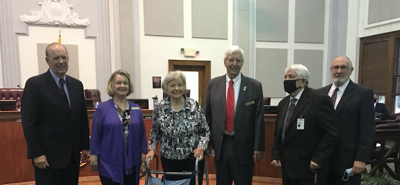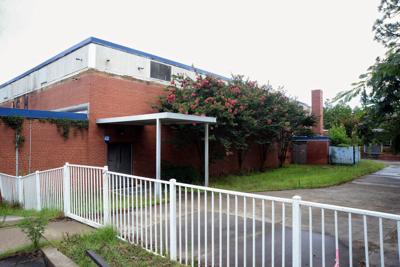Just over a month ago the school board voted 4-3 to sell a portion of the campus to the trust for $300,000 — and the trust’s leaders appeared resigned to curtailing their plans for a Black community and cultural center to five acres.
By another 4-3 vote on Wednesday night, the board agreed to negotiate terms for a sale of the full 17 acres for $685,000. That’s both the value of the property as most recently appraised earlier this year and the amount the Southern Pines Land and Housing Trust offered for the old campus this summer.
“We did not have our expectations high. Still there were a lot of people who didn’t believe it was going to happen,” said Southern Pines Land and Housing Trust Chair Vincent Gordon.
“I’ve received quite a bit of email and everybody’s really happy. We’re going to do what we can do now to position ourselves for the next phase.”
It covers the five acres at the corner of Carlisle Street at West New York Avenue, one of the few known sites of 1920s-era Rosenwald schools still remaining. The campus also includes Blanchie Carter Discovery Park, which the town of Southern Pines hopes to see preserved as a public park, the auditorium and gym of the former West Southern Pines segregated high school, classrooms, and 2.7 vacant acres opposite West Indiana Avenue.
This time, board member Stacey Caldwell voted with Libby Carter, Ed Dennison and Pam Thompson in the most recent vote to move toward selling the entire property to the trust.
“We’re extremely happy that the school board has finally recognized fair market value for the land trust. That’s what we’ve always been asking for,” said Gordon. “I personally thank the four who voted on our behalf, because they showed some courage last night.”
The school board and land trust had settled last month on a $300,000 purchase price for only the former Rosenwald school site, which is subject to deeds designating it for the perpetual use of “Negro education.”
A lot happened between the two votes.
The district discovered that the utilities supporting the auditorium, gym, and academic buildings are too interconnected to cheaply subdivide the built portion of the property, and the town of Southern Pines invited the school board to negotiate a sale of the four-acre Blanchie Carter Discovery Park.
Debate over what the other 12 acres might bring in a competitive bidding process continued on Wednesday. Another two potential buyers indicated that they would have been willing to pay significantly more than $685,000 for the entire campus, but neither was interested in the remainder after the board voted to sell the corner parcel to the trust.
“At this time I just think with the new information that’s come as far as the boilers and the dollar value for having to get that corrected, I think we need to sell the property as-is to the land trust,” said Thompson.
Before the vote, board member Robert Levy moved to use the trust’s standing $685,000 offer as the starting point in an upset bidding process. Levy has been a proponent of keeping the recently retired schools in Aberdeen and Southern Pines to use for school growth in the future: to offset crowding at Pinecrest, provide for a third middle school in southern Moore County, or as potential early childhood education sites.
“At this point it doesn’t look like the board is willing to totally preserve these things, so if you don’t preserve it then we need to get the maximum amount,” he said.
Levy’s motion failed by the same 4-3 vote in favor of selling to the trust outright. School boards can sell property of historic interest directly to nonprofit groups, without inviting competing bids, as long as such sales net the district a fair price.
Carter pointed out that the school’s progress toward selling the four recently retired schools in Aberdeen and Southern Pines, taken in total, is shaping up to end within $100,000 of the properties’ original 2019 appraised value.
Southern Pines Elementary sold to Moore Montessori Community School for $1.6 million earlier this year. That was $500,000 over its appraised value. The schools are finalizing a sale of the old Aberdeen Primary at $473,000 to the highest of half a dozen bidders.
“I think that it is a very fine sum that we would be bringing in, and it would eliminate the continual and ongoing expenses that we are incurring by simply holding this property,” said Carter.
“We all agree that we are not in the real estate business. We need to get out of the real estate business, and I truly feel that going ahead and negotiating with the land trust for the full purchase of all the property there at Southern Pines Primary at the appraised value would be the best step that we could take in realizing our move out of the real estate business.”
Board member David Hensley supported the motion to set $685,000 as the starting bid and invite other offers. He suggested that the previous higher offers may come back into play if the school board puts the entire property up or bid.
Proceeds from the school sales have already been designated for capital improvements at campuses that are still in service, according to a list of priorities the board approved earlier this year.
Moore County Schools now stands to net $3.5 million or so from the sales of the four schools. Levy pointed out that, from that board-approved list of capital projects, that’s equivalent to the cost of new running tracks at Pinecrest and North Moore plus $1 million in heating and sewer system improvements at a handful of smaller schools.
“As opposed to, think about it, building a new school, one new school is $32 million. But we have schools, schools that we could use,” he said.
“I almost feel like we’re trading the cow for magic beans.”
Moore County Schools is also working toward finding a buyer for its other remaining unsold campus: Aberdeen Elementary. On Wednesday the board agreed in a 5-2 vote to continue negotiating with the town of Aberdeen toward the sale of that school.
Board member Philip Holmes joined Levy in opposing the motion altogether.
“They’re not making land anymore and I share Mr. Levy’s view that we do need to keep the school,” he said.
But that vote wasn’t intended as a commitment to selling the campus for the $853,000 that the town offered earlier this month. Levy suggested that the school could serve as a satellite campus for Pinecrest High, which now serves about 2,200 students in buildings designed for 1,600.
“I don’t really want to put the staff in a box. You guys have imagination on top of imagination and you may come back with one of the great alternatives of all time to do with the school, but I think what you can take from this is that we’re going to keep it, at least for now, and that we’re going to see about doing things like repurposing it,” he said.
Some Pinecrest students are dual-enrolled at Sandhills Community College, where they spend part of their school day, alleviating that burden somewhat.
Hensley supported further exploration of the satellite school concept while also voting to continue discussions with Aberdeen.
“If Pinecrest is 30 percent overcrowded, and assuming that’s increasing, you know maybe we ought to look at that. I don’t know the suitability of it, but the idea does have merit,” he said.
“It doesn’t mean that we can’t enter into really good faith negotiations with the town of Aberdeen.”
Before the new Aberdeen Elementary School opened, the district’s most recent inventory of the old school’s building needs indicated that the facility is due for about $1 million in repairs and upgrades.
“One of the things we must remember, though, in talking about repurposing these buildings is the current state of these buildings, which were deemed I won’t say beyond repair but in need of very, very great repair if they were to be continued in use as an elementary school,” said Carter.



